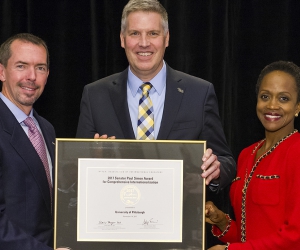
IFL and CUE Receive $7.4 Million Grant from the Gates Foundation

The Institute for Learning (IFL) in partnership with the University of Pittsburgh School of Education’s Center for Urban Education (CUE) and Dallas Independent School District will serve as a network improvement hub in literacy for 12 Dallas ISD secondary schools serving predominantly African American, Latino, and low-income students with a five-year, $7.4 million grant from the Bill and Melinda Gates Foundation.
In collaboration with Dallas ISD leadership, IFL and CUE will support teams of teachers and leadership from six high schools and six of their feeder middle schools to use continuous improvement methods to increase the number of African American, Latino, English language learners, and low-income students who are on-track for high school graduation at the end of 9th grade. The work will initially focus on English Language Arts and writing.
Research has shown that writing is a foundational skill that is critical to success in other courses and in college. A clear set of research-based writing strategies are now available for supporting struggling students to improve their writing.
IFL and CUE will partner to:
Support and coach school teams, comprised of ELA teachers, instructional coaches, and building level leaders, to analyze the root causes of low ELA performance, identify and test research-based strategies/changes to address root causes, and collect and study formative data to determine if the changes are leading to improvement.
Support and coach principals to set the conditions for schools’ teams to engage in continuous improvement work and engage school teams in studying formative data and identifying scalable changes.
Support district leaders to understand and support the school teams’ work and build their capacity to run improvement networks in the future.
Support the network of school teams to learn from and with each other and build their capacity to use continuous improvement as their go-to method for solving problems of practice.
IFL and CUE will use their extensive experience and resources and draw on the expertise of the school teams to address the network’s problem of practice in the context of their school and particular students with the goal of supporting and building capacity within schools to improve student outcomes.
The work of the IFL is grounded in an improvement science (IS) approach (often referred to as continuous improvement) widely used in healthcare networks and education organizations. Their IS approach involves the following key processes:
analyzing a variety of data to understand a problem of practice and how it manifests in local contexts;
developing a working theory of improvement (represented as a driver diagram that shows the strategies/changes that will be used to reach the goals);
identifying and testing strategies aligned with the driver diagram in short cycles; and
consolidating network learning from small tests of change enacted in multiple contexts and spreading the most promising changes.
IS provides a strategic approach to learning from practice through the use of rapid tests of change, often referred to as Plan-Do-Study-Act (PDSA) or inquiry cycles. PDSA cycles are a structured routine for testing a change idea, such as the introduction of a writing strategy into existing practice. Each cycle is a mini-experiment that involves the introduction of some change, a prediction of the outcome, and the collection of user-friendly evidence (often student work samples or observations) to examine whether the change appears to be an improvement. The cycle concludes with analysis and reflection, which leads to identification of the next step. In this way, a network can build a knowledge base about how to address the problem of practice as these cycles of change are tested over and over in different contexts.




